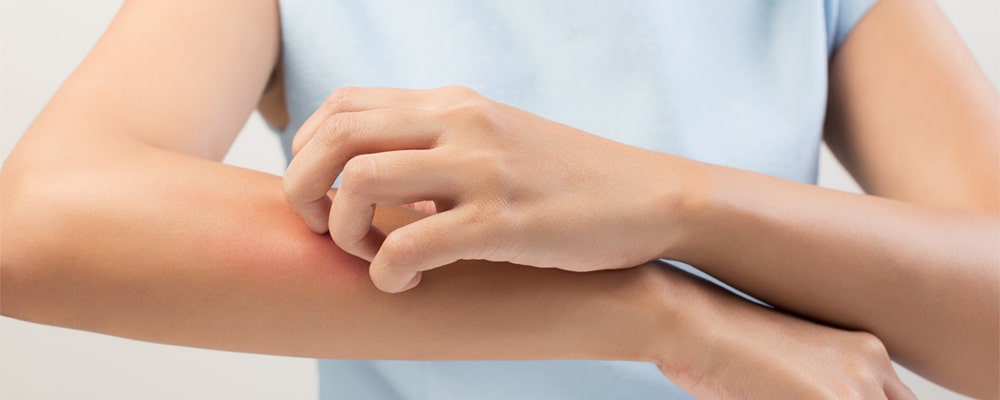Red, itchy skin may be the result of eczema. These itchy, red patches can appear on your baby’s face or chest. Or you may have noticed something that looks the same on your own arms, neck, or legs. Determining what kind of eczema it is and what triggers it are the first steps in choosing effective treatment to manage symptoms.
What Is Eczema?
Eczema is a term for a variety of skin conditions that can cause inflammation. The different types of eczema include:
- Atopic dermatitis
- Contact dermatitis
- Dyshidrotic eczema
- Nummular eczema
- Seborrheic dermatitis
- Stasis dermatitis
Atopic dermatitis is the most common form of eczema.
What Are the Symptoms of Eczema?
Commonly, eczema causes the affected skin to become dry, itchy, and red. In some cases, eczema results in a high level of dryness, so that the skin thickens and cracks. If infection sets in, open sores with crusts may develop. Eczema can appear on any part of the body, but it’s commonly found on the face, neck, hands, and legs.
What Causes Eczema?
Human skin is designed to retain moisture as a measure of protection against irritants, allergens, and bacteria. Eczema develops in individuals who have a genetic variation that affects the skin’s capabilities in providing this protection. This genetic variation allows the skin to be affected by irritants, allergens, and bacteria. To sum it up, genes and environmental triggers both contribute to the development of eczema.
Research has also shown that eczema is not contagious and that it tends to run in families. Although eczema is not an allergic reaction, people with eczema tend to also have food allergies.
How Is Eczema Treated?
There is no cure for eczema, but getting it diagnosed and treated helps manage symptoms to give both children and adults the relief they need.
Treatment options for eczema can include:
- Antibiotic creams to prevent or stop the spread of bacterial infections from open sores or cracks.
- Creams to control itching and aid in skin repair, such as corticosteroid creams or ointments.
- Oral corticosteroid medicines to control itching and assist in repairing the skin.
In cases of severe eczema, your doctor can recommend:
- Applying a topical cream, and then wrapping the affected skin area in a dressing.
- Phototherapy that uses light may also be used. Phototherapy exposes the skin to controlled amounts of natural sunlight, artificial ultraviolet A (UVA), or ultraviolet B (UVB).
- Eczema clinical trials could be an additional treatment option to think about if other therapies do not provide successful results.
What Are Some Ways to Manage Your Eczema?
Simple ways to manage your eczema that you can do at home include:
Prevent dry skin by:
- Use lukewarm (not hot) water for showers or baths.
- Keep showering or bathing sessions short (less than 15 minutes).
- Use mild soaps or body cleansers that don’t contain heavy perfumes.
- Dry yourself carefully. Don’t rub, but pat yourself dry.
- Apply moisturizing, fragrance-free skin lotions all over your body right after bathing.
- Moisturize the skin twice a day.
If you’re still searching for the right treatment option for eczema, are seeking affordable treatment options, or are looking for paid compensation, sign up for a future clinical trial today. With more than 25 years of experience performing dermatological clinical trials — our health professionals are highly trained and committed to making sure all clinical guidelines are met and that patient rights are always protected. Call 561-948-3116 or fill out the form on this page to learn more about our clinical trial options today.

